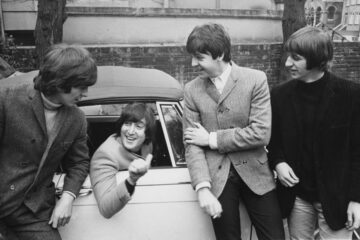As Bob Dylan’s impressive career demonstrates, one can get by with limited technical vocal ability and virtues in other spheres. In Dylan’s case, songwriting is his most vital strength, but his vocal delivery and timbre are still inherent to his individuality and, hence, career longevity. In the vocal department, The Beatles combined a similar identity with technical ability in a heady cocktail that helped to redefine pop music through the 1960s.
When judging vocals, it is important to understand the difference between subjectivity and objectivity. For example, I would prefer to listen to George Harrison singing ‘Wah-Wah’ than Céline Dion singing about her heart and in which direction she wishes it to go. However, in objective terms, such as range, dynamic command and projection, Dion is, of course, superior. With this in mind, let’s see if we can decide on a definitive answer for the titular question.
In a classic rock lineup like that of The Beatles, it is exceedingly rare for all members, drummer included, to have multiple lead vocal credits. It just so happens that the Fab Four’s nuanced yet complementary personalities are reflected in their voices. Ringo Starr’s voice generally suited bounding, playful songs like ‘Yellow Submarine’, ‘Octopus’s Garden’ and ‘What Goes On’. Though his contributions were scarce, they were crucial to the Beatles canon.
Starr was the only fully baritone voice in the band and had a limited range. Accordingly, most of his contributions were as a backing vocalist. Meanwhile, Paul McCartney, John Lennon and Harrison were the more accomplished and, ultimately, experienced singers, all residing mostly in the tenor range. If Starr’s range covered around one octave and three notes from C3 to Eb4, Harrison’s was in third place with a range of one octave and six notes from G3 to D5.
Harrison usually led his songwriting contributions and had a unique approach to pitch transition. Like Starr, Harrison was a crucial contributor to some of the band’s most iconic harmonies, a truly indisposable voice. With Harrison and Starr respectfully sidelined in the running for best vocalist, we are left with the band’s main songwriting partnership and most credited lead vocalists, Lennon and McCartney.
Now, this is where subjectivity will be most difficult to ignore. If you asked me to pick my favourite voice in The Beatles, I would choose Lennon. His contributions to songs like ‘Twist and Shout’, ‘I’m Only Sleeping’, ‘Happiness is a Warm Gun’ and ‘Yer Blues’ (The Dirty Mac version) were simply astonishing and never failed to raise the neck hair. But perhaps my taste in vocals is skewed somewhat by the fact that I often prefer Lennon’s songwriting contributions, too.
It is interesting to note at this point that ‘Oh! Darling’, one of McCartney’s more demanding lead vocals, was a matter of contention between the songwriting duo. Although McCartney wrote the song, Lennon felt it was more up his street. “‘Oh! Darling’ was a great one of Paul’s that he didn’t sing too well. I always thought that I could’ve done it better – it was more my style than his,” Lennon told David Sheff in 1980. “He wrote it, so what the hell, he’s going to sing it. If he’d had any sense, he should have let me sing it.”
McCartney took several attempts before nailing, ‘Oh! Darling’ in 1969. According to recording engineer Alan Parsons, the bassist recorded just one attempt per day, first thing in the morning, to give his voice a chance to recover. “I suppose he wanted to capture a certain rawness, which could only be done once before the voice changed,” Parsons suggested.
Although McCartney’s recording was faultless to my untrained ear, it would have been interesting to hear Lennon put his money where his mouth was. If a Lennon-led alternative struck the same peaks and troughs in perfect timing, it would be up to the listener to decide on a subjective level.
To give you a definitive answer to the titular question, most evidence in the Beatles catalogue and published accounts suggest that McCartney just about had the edge on Lennon objectively. Impressively, McCartney’s vocals range(d) from C3 to Eb5 across two octaves and three notes, while Lennon’s covered one octave and one note from E3 to E5. Both had similar control over their vocal dynamics in their prime, leaving McCartney with a slim victory.



